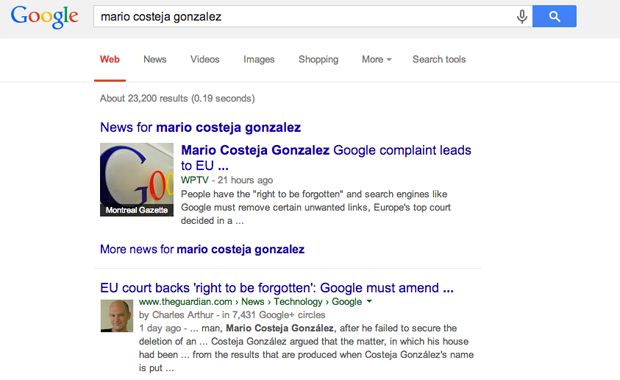22 May 2014 | Counterpoint, Digital Freedom, News and features, United States

Graham Ginsberg shows how he feels about his search engine profile. (Photo courtesy Graham Ginsberg)
The internet is so much more significant than a newspaper article. It’s bigger than print in its longevity and reach and it’s forever growing, shaping the public lives for all generations, past, present and future.
The handling of this information has become exponentially important. The quote “With great power comes great responsibility” comes to mind. But where is the responsibility when it comes to showing our personalities, our castle, in search engines?
When search engines choose to show information about me, as an example, do they show all available information about me or do they choose certain articles and pictures they consider most relevant and fresh to show the public? And why is there no redress available to me to deal with how search engines portray me?
I recently submitted a complaint to three major search engines requesting that they remove certain pictures and references to articles about me that were old and irrelevant.
Google didn’t respond back, but Bing’s Technical Support did saying, “Thank you for contacting Bing Technical Support regarding your request to remove content from the Bing search engine. Working directly with the site owner or webmaster for removal of the content is the best way to resolve your issue. Bing doesn’t control the operation or design of the websites we index. We also don’t control what these websites publish. As long as the website continues to make the information available on the web, the information will be generally available to others through Bing or other search services.”
But this isn’t entirely true on several levels. But it’s their boilerplate response back, kind of a “it’s not our fault” statement.
Search engines like Bing, Google and Yahoo, do limit and restrict information they show in search results by using software that prioritizes and sorts data into a format it deems suitable.
What is censorship?
Censorship is the act or censoring, the removal or suppression of what is considered morally, politically, or otherwise objectionable. And this is precisely what search engines do right now in their own way using customised algorithms.
Bing suggested that I contact the webmaster in the hope that they would remove the information from being indexed on the internet. Bing suggests that they remove a story as if it never existed. But that isn’t my gripe. I have no problem that our local daily newspaper has pictures and an article about me protesting in front of their establishment. They have every right to have it and I don’t want it removed from their website.
But I have an issue with Bing for showing the information as if it was the only information there was on me. And there is a ton of information about me; from articles I had written to the local paper on a whole bunch of different subjects from national beach access issues to real estate, but little if any is shown in the search results. Just me standing in front of the paper protesting with a noose around my neck, almost ten years ago. Maybe the algorithms looks for keywords like ‘noose’ and prioritizes them higher than say and article about NBA Hall of Famer Larry Bird and his house, which I contributed last year in the same paper.
Because search engines are moneymaking machines, any customized filtering of search results will cost them dearly. And why not, they’re businesses like any other and should be held accountable for their product they’re selling. But what makes search engines different from any other business is they’re so big and powerful and that is why governments need to have means to force them into compliance.
It’s the Wild West all over again. Asking search engines like Google and Bing to police themselves, to be fair and moral has proven to be futile and why should they care or even act accordingly?
To keep the peace for the common good, laws need to have teeth to force offending search engines to comply with logical guidelines that protect the interests of the public and not just interests of these large search engine corporations.
This article was posted on 22 May 2014 at indexoncensorship.org
21 May 2014 | Counterpoint, Digital Freedom, European Union, News and features

Enshrining the right to be forgotten is a further step towards allowing individuals to take control of their own data, or even monetise it themselves, as we proposed in the Project 2020 white paper (Scenarios for the Future of Cybercrime). The way the law stands in the EU currently, we have legal definitions for a data controller, a data processor and a data subject, an oddity, which lands each of us in the bizarre situation where we are subjects of our own data rather being able to assert any notion of ownership over it. With data ownership comes the right to grant or deny access to that data and to be responsible for its accuracy and integrity.
In response to the ECJ judgement, I have seen a lot of commentators cry “censorship” and make all kinds of unsupportable comparisons with book burning (or pulping), these reactions are misguided and out of all proportion to the decision made. Let’s remember what has been decreed is that an individual has the right to request that certain information be de-indexed from search and aggregation engines. That request is not an order and each one must go through due process and consideration before any changes are made, including if necessary consideration by a court of law. Individuals are not being granted the right to rewrite history, they are being given the right to request, within the strictures of the law, that certain publishers cease to publish information about them which they consider deleterious. They are being given the right to be able to manage their own image online, it seems bizarre that this right is seen by some as the repression of free speech when in effect it gives the individual the right to speak up about something which they find personally damaging.
In 2009, an organisation called “The Consulting Association” was found to be operating a commercial blacklist service to the construction industry. This organisation held detailed files on construction professionals, listing their names, family relationships, newspaper cuttings and details of criminal records. Several global construction companies paid for access to this data and over 3000 individuals were potentially prevented from gaining employment in their industry. Of course this shocks us, and rightly the Information Commissioner took action, seizing the data in question and informing those affected. In many ways a search engine’s constant aggregation of data and even more its contextualisation and publication of that data as relevant to a given name fulfils the same function, now you have a right to at least influence it, even if you cannot stop it.
The ruling is the right one. The court recognises that information that was “legally published” remains so and that the individual has no right to censor it. However, they also recognise that search engines collect, retrieve, record, organise, store and disclose information on an on-going basis and that this constitutes “processing” of data under the EU directive. Further, given that the search engine determines the means and purpose of their own data processing, they are also a “Data Controller” under that directive and again must fulfil the legal requirements of such an entity; any other court decision would weaken that whole directive beyond repair. The entirety of information turned up in response to a search on a person’s name, represents a whole new level of publishing and the discrete items of information would have been very difficult, if not impossible, to put together in the absence of a search engine.
While there will of course be technical and procedural issues that arise from this ruling and there will doubtless be individuals seeking to evade public scrutiny, any other decision on this would have simply blown away the EU Data Protection directive and that is not something any us should be advocating. Consider the wider ramifications of this decision, if a search engine is now a “Data Controller” in the eyes of the law, shouldn’t they be notifying us whenever they collect information about us? Would it be a breath of fresh air if you could begin to understand the wealth of information out there about you and begin to realise an income from it yourself? Personal information is a commodity that commands a financial premium and right now it is others who realise those gains. It’s time we advocated for real ownership of our own data.
Before personal data became a commodity mined by corporations and attackers alike, the need for a legal stance on the identity of the “owner” of data relating to oneself may have seemed laughable. However that has landed us in the situation of today when entities that mine and monetise that same data can refer to this very welcome EU ruling as “disappointing”. Commercially disappointing it may be, however it is a step, albeit a small one, in the right direction.
This article was originally posted on May 13, 2014 at countermeasures.trendmicro.eu


